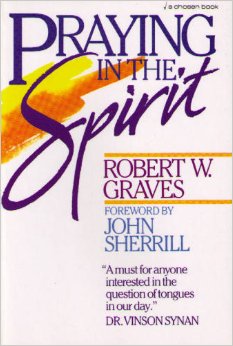Praying in the Spirit: That Glorious Day When Tongues are Not Needed: Until Then … Part 1
In part 1 of the sixth chapter of the Praying in the Spirit Series, author Robert Graves examines the claim that tongues are not needed today. He argues convincingly that tongues are needed and will continue until the return of Jesus Christ.

Robert W. Graves wrote Praying in the Spirit (Chosen Books) in 1987, when it received great reviews from a number of Pentecostal/charismatic scholars and leaders including John Sherrill, Dr. Vinson Synan, Dr. Gordon Fee, Dr. William Menzies, Dr. Howard Ervin, Dr. Walter Martin, and Dr. Stanley Horton. It is the great privilege of the Pneuma Review to republish it here.
“Tongues shall cease.” More than 1,900 years have passed since the apostle Paul penned this prediction in a letter to the Corinthians (c. AD 54), and not a few cessationists have argued that the future tense of the verb (cease) is no longer warranted—the use of the past tense is now justifiable, or so the argument goes. Anti-charismatic Robert G. Gromacki concludes his book, “‘Tongues … shall cease’ (1 Corinthians 13:8). They have” (p. 143). And according to cessationist George Zeller, Paul’s injunction not to forbid tongues “no longer applies today” (p.104).
The Pentecostals and charismatics agree with cessationists that the charismata (spiritual gifts) as described by Paul and Luke are temporary. The disagreement arises when one attempts to determine the factor (and thus arrive at an approximate date) responsible for the cessation of these manifestations of the Spirit. For the charismatic, Scripture, Church history, and personal experience indicate that all of the gifts are to continue through the Church Age. But for the cessationist, the prophetic, miraculous “sign” gifts ceased with the early Church. Some say the cessation was immediate; others claim it occurred over several decades, tapering off gradually.
Cessationists’ Arguments
The anti-charismata cessationists use, for the most part, four arguments to prove the cessation of tongues: (1) Tongues were a sign; (2) Tongues were revelatory in nature therefore the completion of Scripture ended all revelation; (3) After Paul’s letter to the church at Corinth (AD 54), the New Testament is completely silent on tongues, therefore, they had ceased; (4) Historical writings of church leaders after AD 100 do not indicate a continuance of the charismata.
God gave His people the gift of tongues because we needed it. We still need it.
Category: Spirit, Spring 2000


